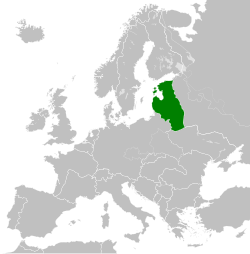Generalbezirk Weißruthenien
| Reichskommissariat Ostland | ||||||
| Reichskommissariat of Germany | ||||||
|
||||||
|
||||||
|
Reichskommissariat Ostland in 1942.
|
||||||
| Capital | Riga | |||||
| Languages | German (official) Belarusian · Estonian Latvian · Lithuanian · Polish |
|||||
| Political structure | Reichskommissariat of Germany | |||||
| Reichskommissar | ||||||
| • | 1941–1944 | Hinrich Lohse | ||||
| • | 1944–1945 | Erich Koch | ||||
| Historical era | World War II | |||||
| • | Führer Decree | 17 July 1941 | ||||
| • | Formal surrender of Courland Pocket | 10 May 1945 | ||||
| Currency |
Reichskreditkassenscheine (de facto) |
|||||
| Today part of |
|
|||||
Coordinates: 56°N 26°E / 56°N 26°ENazi Germany established the Reichskommissariat Ostland (RKO) in 1941 as the civilian occupation regime in the Baltic states (Estonia, Latvia, and Lithuania), the northeastern part of Poland and the west part of the Belarusian SSR during World War II. It was also known initially as Reichskommissariat Baltenland ("Baltic Land").
The political organization for this territory – after an initial period of military administration before its establishment – was that of a German civilian administration, nominally under the authority of the Reich Ministry for the Occupied Eastern Territories (German: Reichsministerium für die besetzten Ostgebiete) led by Nazi ideologist Alfred Rosenberg, but actually controlled by the Nazi official Hinrich Lohse, its appointed Reichskommissar.
Germany's main political objectives for the Reichskommissariat, as laid out by the Ministry within the framework of National Socialist policies for the east established by Adolf Hitler, included the complete annihilation of the Jewish population, as well as the Lebensraum settlement of ethnic Germans along with the expulsion of some of the native population and the Germanization of the rest of the populace. These policies applied not only to the Reichskommissariat Ostland but also to other German-occupied Soviet territories. Through the use of Einsatzgruppen A and B with active participation of local auxiliary forces over a million Jews were killed in the Reichskommissariat Ostland. The Germanization policies, built on the foundations of the Generalplan Ost, would later be carried through by a series of special edicts and guiding principles for the general settlement plans for the Ostland.
...
Wikipedia



